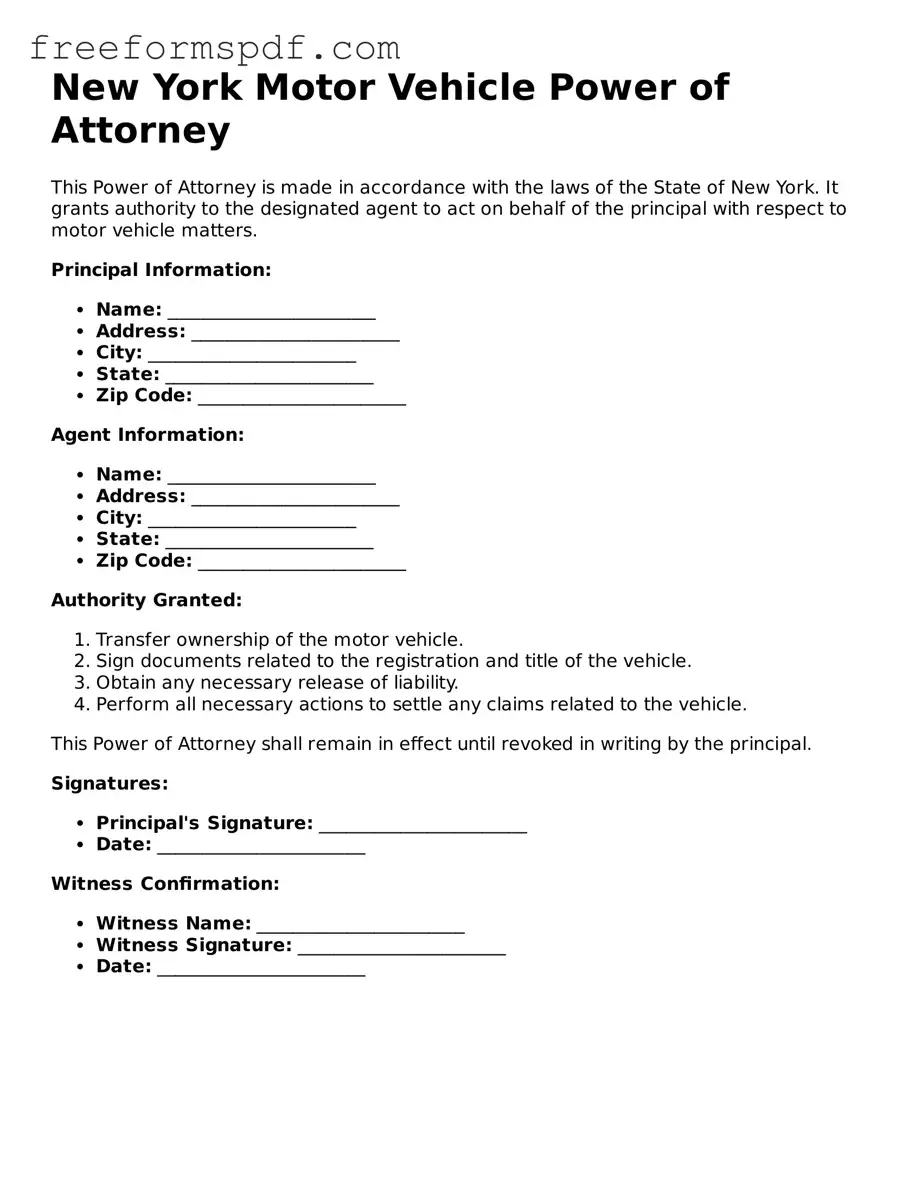Attorney-Verified Motor Vehicle Power of Attorney Document for New York State
Common mistakes
-
Not Using the Correct Form: Many people mistakenly use an outdated version of the Motor Vehicle Power of Attorney form. Always ensure you have the most current version from the New York Department of Motor Vehicles (DMV).
-
Incomplete Information: Failing to provide all required information can lead to delays or rejection of the form. Make sure to fill in every section, including the names and addresses of both the principal and the agent.
-
Missing Signatures: It’s essential that both the principal and the agent sign the form where indicated. Without these signatures, the document is not valid.
-
Incorrect Notarization: Some individuals forget to have the form notarized, while others may not follow proper notarization procedures. A notary must witness the signatures to ensure the document is legally binding.
-
Failing to Specify Powers: The form should clearly outline what powers are being granted. Vague language can lead to misunderstandings or disputes later on.
-
Not Keeping Copies: After submitting the form, it’s wise to keep copies for your records. This way, you can reference the document if any issues arise in the future.
Learn More on This Form
-
What is the New York Motor Vehicle Power of Attorney form?
The New York Motor Vehicle Power of Attorney form is a legal document that allows an individual (the principal) to designate another person (the agent) to act on their behalf regarding motor vehicle transactions. This can include tasks such as signing documents for vehicle registration, transferring ownership, or handling title issues.
-
Who can be designated as an agent?
Any competent adult can be designated as an agent. This means that the person must be at least 18 years old and capable of understanding the responsibilities involved. It is common for individuals to choose family members, friends, or trusted professionals to act as their agents.
-
How do I complete the form?
To complete the form, you will need to provide specific information about both the principal and the agent, including names, addresses, and signatures. Ensure that all sections are filled out accurately. Once completed, both parties should sign the document in the presence of a notary public to validate it.
-
Is the form valid if it is not notarized?
No, the New York Motor Vehicle Power of Attorney form must be notarized to be considered valid. Notarization serves as a safeguard, ensuring that both parties are willingly entering into the agreement and that the signatures are authentic.
-
How long is the Power of Attorney valid?
The validity of the Power of Attorney can vary based on the specific terms outlined in the document. Generally, it remains effective until the principal revokes it or until the purpose for which it was created is fulfilled. It is advisable to specify any expiration dates or conditions in the form.
Misconceptions
Many people have misunderstandings about the New York Motor Vehicle Power of Attorney form. This document allows someone to act on behalf of another person regarding motor vehicle transactions. Below are ten common misconceptions about this form, along with clarifications to help you understand its purpose and use.
- It can only be used for selling a vehicle. This form is not limited to sales. It can also be used for registering a vehicle, transferring ownership, and obtaining title documents.
- Only a lawyer can complete the form. While legal advice can be helpful, anyone can fill out the form as long as they understand the information required.
- It is only valid for a limited time. The Power of Attorney remains valid until the principal revokes it, or until the specific task is completed, unless otherwise stated in the document.
- Both parties must be present to sign. Only the principal needs to sign the form. The agent can sign later on behalf of the principal.
- It can be used in any state. This form is specific to New York. Different states have their own requirements and forms for motor vehicle transactions.
- Once signed, it cannot be revoked. The principal can revoke the Power of Attorney at any time, as long as they are mentally competent.
- It is only for individuals. Businesses can also use this form to designate an agent for motor vehicle transactions on behalf of the company.
- It requires notarization. Notarization is not necessary for the Power of Attorney to be valid in New York, although it may be beneficial in certain situations.
- It can be used for any type of vehicle. The form is primarily for motor vehicles, such as cars and trucks, but may not cover other types of vehicles like boats or motorcycles unless specified.
- It is a complicated document. The form is relatively straightforward. It requires basic information about the principal, the agent, and the specific powers being granted.
Understanding these misconceptions can help you navigate the process of using a Motor Vehicle Power of Attorney in New York more effectively. Always ensure you have the correct form and information before proceeding with any motor vehicle transactions.
Some Other Motor Vehicle Power of Attorney State Templates
Dmv Power of Attorney Oregon - This form is essential for individuals unable to physically manage their vehicle affairs.
For those seeking insight into the usage of a comprehensive Hold Harmless Agreement form, it serves to clarify the responsibilities and liabilities undertaken by parties engaged in various activities. This form is invaluable in instances where risk management is crucial, providing peace of mind and legal safeguarding for all involved.
Texas Motor Vehicle Bill of Sale - This power of attorney can be customized to meet your specific needs regarding vehicle transactions.
Pa Tint Exemption Form - Your approval is still necessary even though the agent acts on your behalf.
